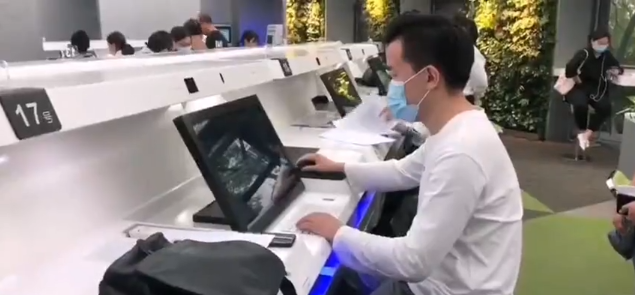Shanghai streamlines business applications


When Ma Jikai wanted to help a friend open a restaurant in Shanghai a number of years ago, the complicated process took over one month and required going to a service center multiple times to obtain permits and licenses.
This time, when he went to the city's Xuhui District Administrative Service Center in May, it took him only 30 minutes to accomplish all the tasks.
"I just entered the 'opening a restaurant' scenario on a self-service machine at the center, then followed the smart guide to print some documents and submitted them to a staff member at a counter," Ma said.
Two weeks after submitting the application, the restaurant opened on June 7.
"It's digital and efficient," he added.
The convenient service Ma received is based on the one-stop approach offered by an integrated offline-online system launched by the Shanghai government, and has delivered tangible benefits to residents since its inception in 2018.
The system enables online and offline information to be shared across different levels in the city and allows registered users to complete all tasks and processes in a single visit.
"Because of data sharing, citizens no longer need to submit similar documents to different departments. This has in turn improved processing efficiency," said Guan Yi, deputy director of the center in Xuhui.
Over 200 physical government service centers staffed by more than 20,000 employees, including the one Ma went to, are available to help residents with offline service requests.
At the center in Xuhui, for example, a 24-hour self-service hall equipped with computers, photography rooms and archive-saving machines, was opened to the public in December 2018.
"Over 730 scenarios like maternity insurance applications are installed in computers. Citizens only need to fill out multiple choice documentation without any assistance from staff members," Guan said.
"It's unnecessary for residents to carry physical certificates issued by governments or identity cards if they download the one-stop government affairs service app, Suishenban, and log on to their personal accounts. The QR code or bar codes on the app can be scanned if needed, according to instructions."
Zhao Zhengrong, a programmer, just spent around 10 minutes during his one-hour lunch break on a work day to check his social security and public accumulation funds.
"It's so easy to operate," he said.
According to Zhu Junwei, deputy director of the Big Data Center in Shanghai, more than 30 million users have registered on the system's portal. It can offer 2,341 services and has completed 60 million tasks so far.
Secure data linking and exchange can free local citizens from submitting all documents issued by government departments and encourage residents to provide digital certificates instead of physical ones this year to facilitate the government's response to social needs.
"We are also poised to foster the processing efficiency of 14 services most related to residents' lives, but with complex working processes such as medical payment and corporate tax payment," Zhu said.
- Record ocean heat in 2025: a deepening climate challenge
- Beijing offers free two-dose bivalent HPV vaccination for girls
- Hunan students craft opera headpieces from recycled materials
- Haidian police crackdown on campus fraud with new safety model
- Several BRICS countries to conduct maritime military exercises near South Africa
- Shanghai to launch year-long global food festival in 2026




































